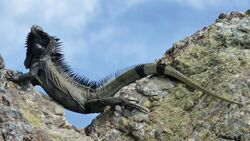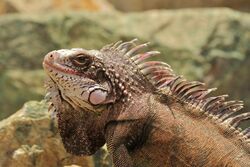Biology:Saban black iguana
| Saban black iguana | |
|---|---|

| |
| In known habitat on Saba | |
| Scientific classification Error creating thumbnail: Unable to save thumbnail to destination
| |
| Domain: | Eukaryota |
| Kingdom: | Animalia |
| Phylum: | Chordata |
| Class: | Reptilia |
| Order: | Squamata |
| Suborder: | Iguania |
| Family: | Iguanidae |
| Genus: | Iguana |
| Species: | |
| Subspecies: | I. i. melanoderma
|
| Trinomial name | |
| Iguana iguana melanoderma Breuil et al., 2020
| |
The Saban black iguana (Iguana iguana melanoderma) is a subspecies (sometimes considered a distinct species) of the green iguana thought to be endemic to the islands of Saba and Montserrat, although external evidence indicates that it may be distributed in other parts of the Caribbean. It was described in 2020 as a distinct species, although the Reptile Database classifies it as a subspecies of the common green iguana (Iguana iguana).[1]
Taxonomy
The subspecies was previously considered to represent melanistic individuals of the green iguana. It was reclassified as a separate subspecies based on a number of genomic distinctions (private microsatellite alleles and unique mitochondrial ND4 haplotypes) and consistent morphological characteristics.[2] Genetic evidence indicates that I. melanoderma is the sister group of the green iguana populations from South America (considered I. iguana iguana), with both forming a clade that is the sister group of the green iguana populations present on St. Lucia and the Grenadines, which are sometimes considered a distinct species, I. insularis.[2][3] The Reptile Database also recognizes the Saban black iguana as a distinct taxonomic entity, but due to its close relation to the green iguana, it (along with the two subspecies of I. insularis) is instead classified as a subspecies of the green iguana, as I. i. melanoderma.[1]
Distribution
As currently defined, the subspecies displays a very unusual disjunct distribution with members being found on Montserrat and Saba, but nowhere else in the Caribbean, although they may have once occurred on Redonda.[3] Due to this, it has been hypothesized that the subspecies may have evolved on one of these locations and then been introduced to the other. However, there are near-indistinguishable melanistic iguanas known from the Virgin Islands and the island of Vieques that, based on preliminary genetic data, may also belong to I. melanoderma. Melanistic iguanas are also known from northern Venezuela, including several coastal islets as well as the vicinity of Cumaná, and these also genetically group with I. i. melanoderma specimens from Montserrat and Saba. While not independently confirmed, this indicates that I. i. melanoderma may have a much larger distribution than just two islands.[2]
It is theorized that coastal Venezuela is the source population for I. i. melanoderma and also where it diverged from other iguanas. Three dispersal events have been proposed; one from coastal Venezuela to either Saba or Montserrat (with Montserrat being more likely if the dispersal was natural), a second pre-Columbian disperal from one of these two islands to the other, and a third to Puerto Rico and the Virgin Islands. These dispersal events may have happened from natural dispersals, transport and introduction by Amerindians and/or European colonists, or both. As parts of its range may have been facilitated by human transport, its strange disjunct distribution may not be entirely natural in origin.[2]
Description
The Saban black iguana is darker coloured than the other subspecies of green iguana, with colouration deepening in older individuals. It possesses a black dewlap, high dorsal spikes, no horns on the snout, and carries a noticeable black spot between the eye and tympanum.[2]
Conservation
It has been suggested that the subspecies is threatened by unsustainable harvest for consumption and the pet trade, and by competition with and hybridization from escaped or released non-native iguana subspecies from the mainland.[2] There have been plans to reintroduce the subspecies to Redonda, where it may have formerly occurred but was extirpated from.[3]
References
- ↑ 1.0 1.1 "Iguana iguana". https://reptile-database.reptarium.cz/species.php?genus=Iguana&species=iguana.
- ↑ 2.0 2.1 2.2 2.3 2.4 2.5 Breuil, M.; Schikorski, D.; Vuillaume, B.; Krauss, U.; Morton, M.N.; Corry, E.; Bech, N.; Jelić, M. et al. (2020). "Painted black: Iguana melanoderma (Reptilia, Squamata, Iguanidae) a new melanistic endemic species from Saba and Montserrat islands (Lesser Antilles)". ZooKeys 926: 95–131. doi:10.3897/zookeys.926.48679.
- ↑ 3.0 3.1 3.2 Knight, Tim; Fauna; International, Flora (2020-06-10). "A Tale of Two Iguanas: New Species Found Hiding in Plain Sight" (in en-US). https://scitechdaily.com/a-tale-of-two-iguanas-new-species-found-hiding-in-plain-sight/.
Wikidata ☰ Q94659710 entry



